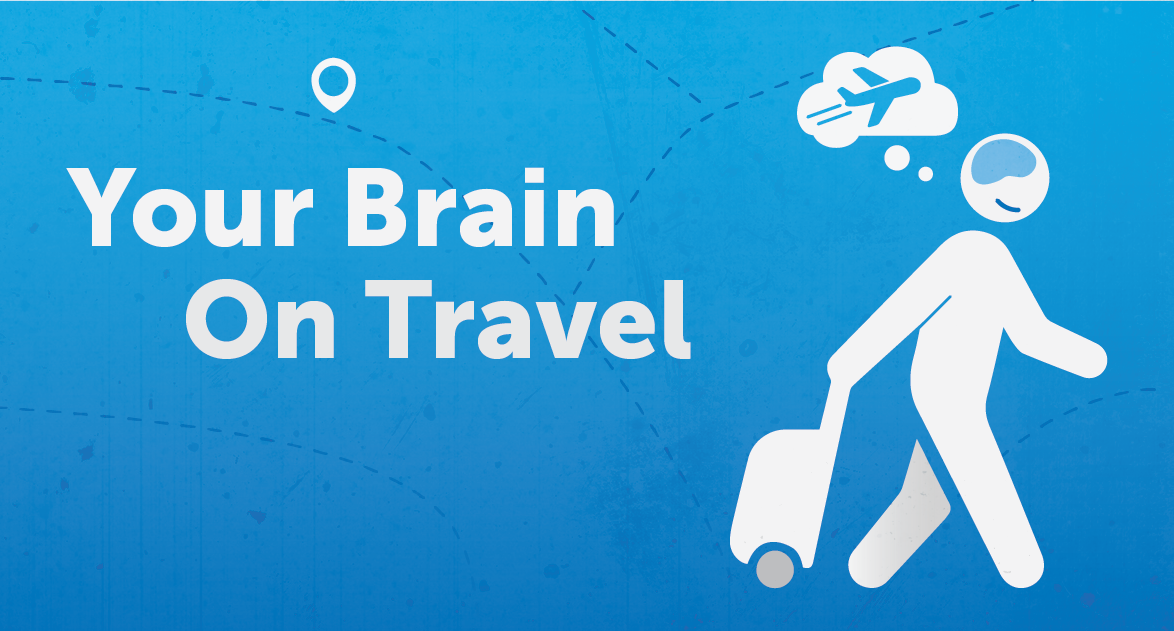Travel is good for the brain.
Travel can bring you to a world of new things and new experiences. You’re navigating unfamiliar territory, and you’re engaging the machinery of the brain that controls your movement across the surface of the planet.
One of the most important things about travel is it places you outside of your normal, predictable, familiar — and boring — physical realm.

When you are traveling, you’ve got to find your way to the bathroom in French, or you have to find your way to that restaurant with that crazy name, or you have to find your way across the city by a truly foreign transit system. All those things, while challenging, are fun – and good exercise for you and for your brain.
The Value of the Unexpected
Taking a trip can transport you to a place where things are unexpected. There are surprises around every corner. Often, you don’t know how things work, what you’re doing, or where you’re going. Regrettably, that leads some people to decide not to make the trip. It all seems too complicated, too dangerous…too challenging. But, those challenges are good for your brain.
In your daily life, almost everything you do is predictable. You get up; you have your strategy for getting to work; and you know where you are going to get the coffee. You know the way — you can practically sleepwalk there. In fact, you do see people who are sleepwalking through life all the time. You wonder if they’re actually alive or maybe zombies — sometimes, it’s hard to tell.
The simple fact is life is too predictable for us. It’s not really meant to be that way. This is one way we’ve changed our world — we’ve tried to make everything so predictable that we don’t really need to use our brains very much.
The Value of Navigating New Territory
It’s really healthy for us to go into a new place where almost nothing is predictable. Where everywhere we go — and everything we want to do — is challenging. We actually have to use our navigational and problem-solving machinery.
A big part of our brain is dedicated to navigation — to knowing where we are in the world. Exercising that navigation equipment — located in the hippocampus of your brain — is really important. It’s one of the parts of our brain most susceptible to loss as we get older. You want to keep your hippocampus in good shape.
The Value of Trying New Things
The best things to do for your brain while traveling really depends on where you are and what you like doing.
Almost everywhere you look on a trip there are new things to experience, new things to try, and new things to learn that can be exciting and fun.
Maybe I’m in Hawaii, and the most fun thing to do is underwater. And, I have the experience of trying to sort out how to snorkel without drowning — or sucking in too much water — and actually see the fish with full enjoyment.
That’s the great thing about a holiday, where you can’t sleepwalk as a zombie, because there are new experiences and problems to solve every day.
The Value of Struggling With A Foreign Tongue
Struggling to try to speak in a foreign language is a good thing for your brain.
When you exercise your brain to receive or produce language, you are exercising communications machinery that is really fundamental to keeping you vital.
When trying to converse in a foreign language, you are forced to really attend to everything that is said to you and that you say. That encourages you to connect with people using your emotional brain. You tend to interact with other people with an intensity that is out of your normal daily realm. That social connection is good for your brain.
The Downside of Travel
Not every part of travel is good for the brain.
We know that jet lag can affect the brain’s performance. It arises because your brain has a type of clock that controls the release of chemical agents and hormones within the brain that are regulating what is supposed to happen hour-by-hour during the day. The adjustment of that clock is very slow, so the jet lag can linger for days. But that’s because we are not really designed to move across the planet at hundreds of miles per hour. In terms of our evolution, that’s been an issue for less than 100 years — a relatively new phenomenon for adaptation by the human brain.
The Upside to Leaving Home
One of the virtues of taking a holiday is that it is loaded with all kinds of challenges.
Of course, not every holiday is like that. You can take a holiday where everything is taken care of and planned for you — such as a really well-organized tour or cruise.
That’s sort of like being at home, in the sense that you don’t have to worry about anything — where you’re going, where the food is coming from — it’s as though someone is going to come around and tie yours shoes for you. To me, part of the fun of a holiday is the exercise of the brain in overcoming challenges. I like a holiday when a lot of it is outside my comfort zone.
Or, put another way, when you travel, remember that if you wanted it to be like home, you would’ve stayed home.
Have a good trip!

